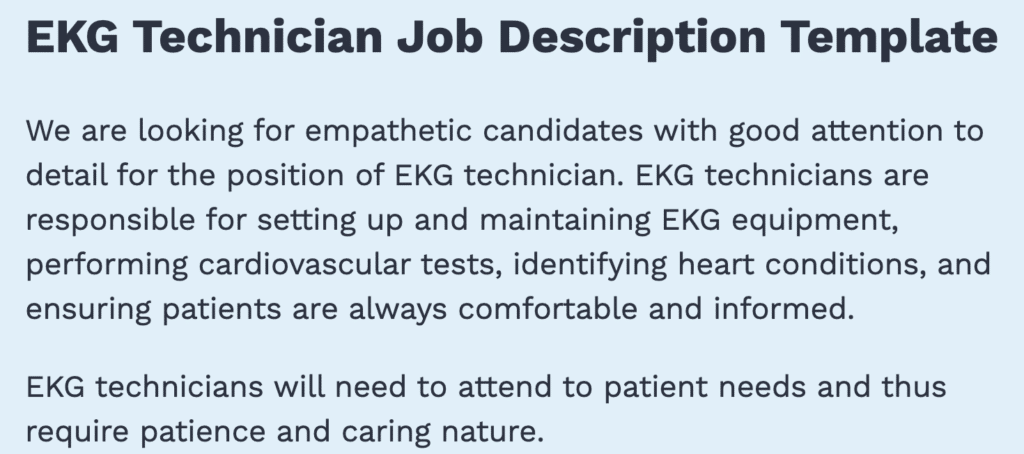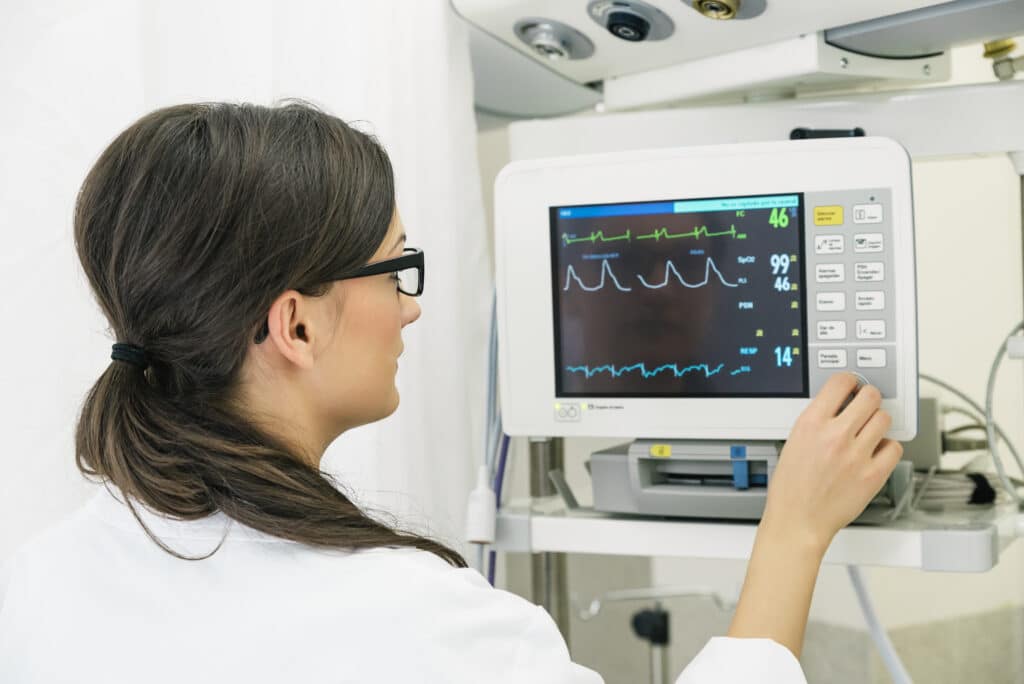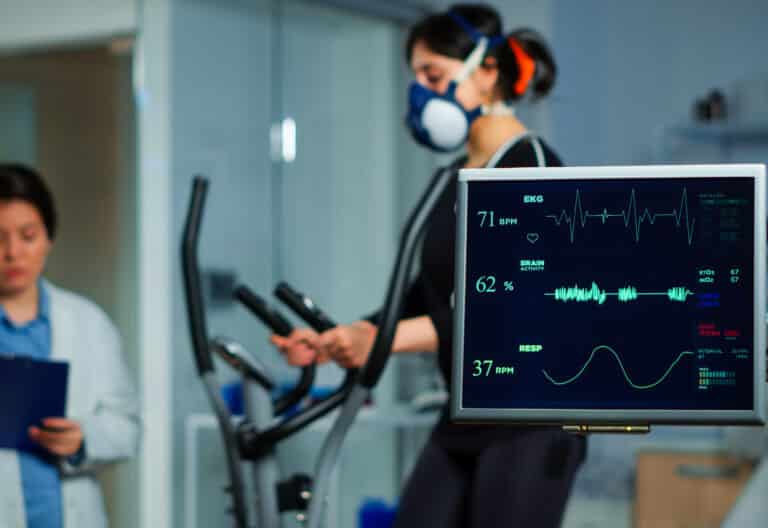EKG technicians are those healthcare professionals who play a vital role in conducting and analyzing electrocardiogram (ECG) tests. With their keen observation, they report any irregularities in the heartbeat.
But that’s not all!
EKG techs have a broader impact on patient care. By sharing their findings with doctors, they contribute to the crucial analysis of cardiovascular health, ultimately shaping the most appropriate treatment plans.
If you are intrigued by this fascinating career; and are ready to delve deeper into the job description, responsibilities, and the essential skills required to excel as an EKG technician – Stay Tuned.
See more: What is an EKG Technician

Let’s embark on a journey to uncover the world of EKG technicians.
EKG Technician Job Description Template
Here’s an example of a job description for an EKG Technician.

Also see: EKG Technician Jobs
EKG Technician Job Description
Job Summary
An EKG Technician performs Electrocardiograms (EKGs) in various settings, including outpatient clinics, emergency departments, and in-house locations.
*There will be additional on-the-job training.
EKG Technician Responsibilities
As an EKG technician, you play a critical role in cardiovascular health. Your dedication to these responsibilities contributes to accurate diagnoses, effective patient care, and the overall well-being of individuals requiring cardiac evaluation.
Conduct Cardiovascular Tests
A primary duty of an EKG technician is performing cardiovascular tests on patients. These tests help determine their heart condition, allowing you to inform doctors of any irregularities or concerns.
Keep Patients Informed
You play a vital role in keeping patients informed and comfortable throughout the procedure. You explain each step, address their questions, and ensure they feel at ease during testing processes.
Identify & Diagnose Heart Conditions
After conducting the tests, you employ your expertise to identify and diagnose heart conditions. Your training enables you to recognize patterns and deviations from normal heart rhythms, promptly communicating your findings to healthcare professionals for further evaluation.
Monitoring Blood Pressure
As an EKG technician, you are responsible for monitoring the blood pressure; of a patient. It involves regularly checking and recording their blood pressure readings during specific procedures or examinations.
Gathering Cardiovascular Data
A crucial aspect of your role is to collect cardiovascular data that doctors can analyze. You contribute by gathering information on the patient’s heart’s electrical activity and producing an EKG tracing.
You ensure accurate documentation of vital details such as time, date, and patient identification.
Work Alongside Doctors, Nurses, and Healthcare Technicians
Collaboration with doctors and nurses is an integral part of your responsibilities as an EKG technician. You actively work together to conduct various tests and maintain accurate reports, fostering a team approach to patient care.
You should also assist in clerical duties such as computer entry, filing, recording, mailing, and maintaining reports, as needed.
Set Up EKG Components

Maintaining and cleaning EKG equipment falls within your purview. You ensure that essential equipment, such as electrodes and leads, is well-stocked and prepared for use, guaranteeing accurate test results.
Provide Patient Support and Reassurance
You should understand that patients may experience anxiety during procedures and are quick to offer vital emotional support, reassurance, and clear instructions.
Your compassionate approach helps patients feel safe and comfortable throughout the testing process.
Follow Safety Protocols
Adherence to strict safety protocols is paramount in your role. You follow guidelines for proper disposal of used supplies, maintain a sterile environment, and adhere to infection control procedures, prioritizing the well-being of patients and yourself.
Recognize Abnormalities
Your in-depth knowledge of heart rhythms and patterns allows you to examine EKG tracings and identify any irregularities or abnormalities. This critical skill enables you to recognize potential heart conditions or problems that require further investigation.
Be a Guide
It is your responsibility to assist; with the training of new employees, student interns, and employees of other departments. Do not hesitate to share your experiences and help them become better EKG technicians.
To know more, read: What does an EKG Technician do?
Qualification and Requirements
Education Required
- High School Graduate or Equivalent
- Completion of EKG training
Also read: EKG Technician Requirements
Experience
There are entry-level jobs, but the top recruiters prefer at least 1 year of medical experience, which includes performing EKGs.
Licenses and Certifications

Some employers prefer extra certifications like CPR (Cardio-Pulmonary Resuscitation) or BLS (Basic Life Support) Certification.
That’s why we have been advising it is for your larger good to take up certifications after you become an EKG Technician.
See: EKG Technician Certification
Some benefits you might expect after you land your dream job:
- Health & Wellness
- Insurance benefits
- Financial support
- Work-life balance
- and more. Benefits vary per Employer.
More on- Certified EKG Technician
EKG Technician Skills
As an EKG Technician, you should have a few skills, such as:
Attention to Detail
As an EKG technician, precision is crucial. From electrode placement to analyzing EKG readings, you must sincerely attend to every detail, ensuring accurate results and identifying any irregularities.
Communication Skills
Effective communication is the key. EKG techs excel in communication.
You listen attentively to patient concerns, explain procedures in a friendly manner, and foster comfort throughout the test. Try to be a bridge between doctors and patients.
Problem Awareness and Solving
A keen sense of problem awareness is crucial. You quickly recognize any issues; with the equipment or test results, calmly troubleshoot, and seek solutions to maintain accuracy.
Adaptability and Flexibility
Your adaptability enables exceptional care in any circumstance. Managing diverse situations, patients of all ages, and unexpected challenges with ease showcases your flexibility in delivering the best possible care.
Empathy and Compassion

An EKG technician embodies empathy and compassion. Understanding the anxiety surrounding medical tests, especially for young patients, you provide emotional support, reassurance, and a comforting presence.
Patience
Patience is your virtue. Creating a calm and comfortable environment for anxious or nervous patients is essential.
Professionalism
Your professionalism ensures their comfort and peace of mind. Demonstrating dependability, competence, and dedication to your work, you instill confidence in patients experiencing significant stress.
To know more, read: Top 10 Duties and Skills of an EKG Technician
So, you know by now that as an EKG technician, your responsibilities encompass a range of essential tasks that contribute to patient care and diagnosis.
If there is something else; stopping you from grabbing this fantastic career opportunity, navigate through the articles below, as we have tried hard to unveil all the information related to the career of an EKG Technician.
Read More:
- Pros and Cons of Being an EKG Technician
- How Long Is EKG Technician Training?
- Certified EKG Technician Salary
- CET Certification
- EKG Technician Resume
- EKG Phlebotomy Technician
- EKG Technician Training





